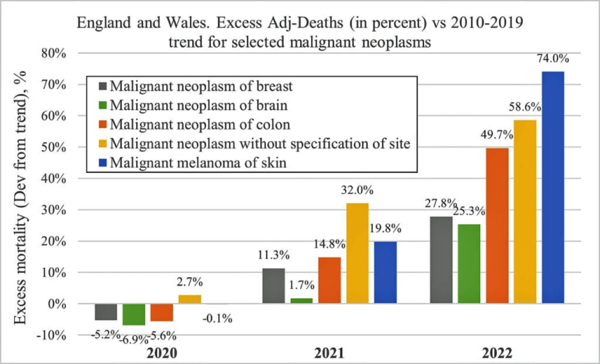 Parler
Parler Gab
Gab
Cancer deaths skyrocket in young adults across the UK since COVID jab rollout
One of the most alarming trends is skyrocketing cancer rates among young people. Fatal cancer rates exploded among U.K. teenagers and young adults who were vaccinated with spike protein mRNA. The 2022 ONS data shows a sudden rise in cancer deaths for the 15 to 44 age group. These cancer rates are well above the norms established from 2010-2019. They include:- A 28 percent increase in fatal breast cancer rates in women.
- A 35 percent and 12 percent rise in brain cancer deaths among men and women, respectively.
- A 55 percent and 41 percent increase in colon cancer deaths among men and women, respectively.
- A 60 percent and 55 percent spike in cancer death rates among men and women, respectively, in cancers "without site specification."
- A 60 percent and 80 percent rise in pancreatic cancer deaths among men and women, respectively.
- A 120 percent and 35 percent jump in fatal melanomas among men and women, respectively.
 Dr. Harvey Risch, a professor emeritus of epidemiology in the Department of Epidemiology and Public Health at the Yale School of Public Health and the Yale School of Medicine has noticed the alarming trend. He said that the number of "turbo cancers" is skyrocketing ever since the launch of Operation Warp Speed.
"What clinicians have been seeing is very strange things," said Risch during an interview for EpochTV. "For example, 25-year-olds with colon cancer, who don't have family histories of the disease – that's basically impossible along the known paradigm for how colon cancer works – and other long-latency cancers that they're seeing in very young people."
Risch and his colleagues are seeing young people suffer through re-manifestation of cancers that usually take many years to form after they had been surgically removed.
"Those are the initial signals that we've been seeing, and because these cancers have been occurring to people who were too young to get them, basically, compared to the normal way it works, they’ve been designated as turbo cancers," Risch explained.
Dr. Harvey Risch, a professor emeritus of epidemiology in the Department of Epidemiology and Public Health at the Yale School of Public Health and the Yale School of Medicine has noticed the alarming trend. He said that the number of "turbo cancers" is skyrocketing ever since the launch of Operation Warp Speed.
"What clinicians have been seeing is very strange things," said Risch during an interview for EpochTV. "For example, 25-year-olds with colon cancer, who don't have family histories of the disease – that's basically impossible along the known paradigm for how colon cancer works – and other long-latency cancers that they're seeing in very young people."
Risch and his colleagues are seeing young people suffer through re-manifestation of cancers that usually take many years to form after they had been surgically removed.
"Those are the initial signals that we've been seeing, and because these cancers have been occurring to people who were too young to get them, basically, compared to the normal way it works, they’ve been designated as turbo cancers," Risch explained.
Mortality rates skyrocket for young people who took 4 COVID jabs
In January 2023, the mortality rate per 100,000 person-years was 31.1 for the unvaccinated cohort. For individuals who took one COVID jab, mortality rates were much higher - 53.3 per 100,000 person-years. For the quadruple vaccinated, the rate was a shocking 106 per 100,000 person-years. The average mortality rate per 100,000 person years from January to May was 26.56 for unvaccinated young adults and 94.58 per 100,000 person years for quadruple vaccinated young adults - a stark contrast. A similar pattern was observed for adults aged 40 to 49. For every single month since the beginning of 2023, adults in this age group who were vaccinated with one or four doses were significantly more likely to die than their unvaccinated peers. January 2023 mortality rates were the worst for individuals who received either one or four COVID jabs, with a mortality rate per 100,000 of 411.3 and 258.5, respectively. In contrast, the unvaccinated saw a mortality rate of just 144.5 per 100,000.
The unvaccinated, having withstood aggressive coercion, abuse, and threats to their lives and livelihoods, are faring the best over the long haul, even after putting up with the stress, the lies, and abuse for the past three years.
A similar pattern was observed for adults aged 40 to 49. For every single month since the beginning of 2023, adults in this age group who were vaccinated with one or four doses were significantly more likely to die than their unvaccinated peers. January 2023 mortality rates were the worst for individuals who received either one or four COVID jabs, with a mortality rate per 100,000 of 411.3 and 258.5, respectively. In contrast, the unvaccinated saw a mortality rate of just 144.5 per 100,000.
The unvaccinated, having withstood aggressive coercion, abuse, and threats to their lives and livelihoods, are faring the best over the long haul, even after putting up with the stress, the lies, and abuse for the past three years.
 Sources include:
NewsAddicts.com 1
ONS.gov.uk
NewsAddicts.com 2
TheEpochTimes.com
Sources include:
NewsAddicts.com 1
ONS.gov.uk
NewsAddicts.com 2
TheEpochTimes.com
SILENCED: Moderna hires FBI to secretly police, control online vaccine debate
By Ethan Huff // Share
Google FAKES Gemini AI video to pump up its stock price
By Belle Carter // Share
Governments continue to obscure COVID-19 vaccine data amid rising concerns over excess deaths
By patricklewis // Share
Tech giant Microsoft backs EXTINCTION with its support of carbon capture programs
By ramontomeydw // Share
Germany to resume arms exports to Israel despite repeated ceasefire violations
By isabelle // Share










